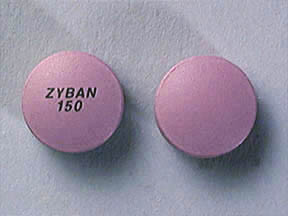BUPROPION SUSTAINED-RELEASE (SMOKING DETERRENT) - ORAL
PHONETIC PRONUNCIATION: (bue-PROE-pee-on)
COMMON BRAND NAME(S): Zyban
GENERIC NAME(S): bupropion HCl
Uses
USES: This medication is used in combination with a stop-smoking program (e.g., support group, counseling) to help you quit smoking. Bupropion can decrease your nicotine withdrawal symptoms (e.g., irritability, anxiety, restlessness) and your urge to smoke. Quitting smoking decreases your risk of heart and lung disease, as well as cancer. This medication belongs to a class of medications known as antidepressants. It is not known exactly how bupropion works to reduce smoking urges. It may work by restoring the balance of certain natural chemicals (neurotransmitters) in the brain. Discuss the risks and benefits of this medication, as well as other ways to quit smoking (such as nicotine replacement treatment), with your doctor.
How to use BUPROPION SUSTAINED-RELEASE (SMOKING DETERRENT) - ORAL
HOW TO USE: Read the Medication Guide and, if available, the Patient Information Leaflet provided by your pharmacist before you start using bupropion and each time you get a refill. If you have any questions regarding the information, consult your doctor or pharmacist. Take this medication by mouth, usually twice daily with or without food. If stomach upset occurs, take with food. It is important to take your doses at least 8 hours apart or as directed by your doctor to decrease your risk of seizure. You may have trouble sleeping when you start taking this drug. Do not take your evening dose too close to bedtime. Do not crush or chew this medication. Doing so can release all of the drug at once, increasing the risk of side effects, including seizures. Also, do not split the tablets unless they have a score line and your doctor or pharmacist tells you to do so. Swallow the whole or split tablet without crushing or chewing. Your dosage is based on your medical condition and response to therapy. Your dose may be slowly increased to limit side effects. Do not take more or less medication than prescribed. Do not take more than 150 milligrams in a single dose. Do not take more than 300 milligrams per day. Taking more than the recommended dose of this medication may increase your risk of having a seizure. It is recommended that you do not try to quit smoking until you have been taking bupropion for 1 week so that the drug can reach a high enough level in your blood. Set a date for quitting, and stop smoking sometime in the second week of taking the drug. If necessary, this medication may be combined with nicotine patches or gum to help you quit smoking. Ask your doctor for more information. The combination of nicotine and this medication may increase your blood pressure. Your doctor may need to monitor your blood pressure closely. Do not smoke at any time if using any nicotine products with this drug. Too much nicotine can cause serious side effects. Use this medication regularly in order to get the most benefit from it. To help you remember, use it at the same times each day. Tell your doctor if you are not able to stop smoking after 7 to 12 weeks on this medication.
Side Effects
Precautions
Interactions
Overdose
Images

- color
- light green
- shape
- round
- imprint
- M BU1

- color
- white
- shape
- round
- imprint
- WPI 867

- color
- white
- shape
- round
- imprint
- WPI 867
Reviews
Faq for BUPROPION SUSTAINED-RELEASE (SMOKING DETERRENT) - ORAL
Bupropion sustained-release is used to help people quit smoking by reducing the cravings and withdrawal symptoms associated with nicotine addiction.
The exact mechanism of how Bupropion sustained-release helps people quit smoking is unknown. However, it is believed to work by increasing certain chemicals in the brain that are associated with mood and addiction.
It usually takes about 1 to 2 weeks for Bupropion sustained-release to start reducing the cravings and withdrawal symptoms associated with quitting smoking. However, it is important to continue taking the medication as directed by your healthcare provider.
Bupropion sustained-release is generally considered safe when used as directed by a healthcare provider. However, like any medication, it may have some side effects. It is important to discuss your medical history and any potential concerns with your healthcare provider before starting Bupropion sustained-release.
Common side effects of Bupropion sustained-release may include dry mouth, trouble sleeping, headache, nausea, dizziness, and changes in appetite.
No, Bupropion sustained-release may not be suitable for everyone. It is important to discuss your medical history and any potential contraindications with your healthcare provider before starting this medication.
The duration of Bupropion sustained-release treatment may vary depending on individual needs. It is generally recommended to take it for at least 7 to 12 weeks. However, your healthcare provider will determine the appropriate duration for you.
Yes, Bupropion sustained-release can be used with other smoking cessation methods, such as nicotine replacement therapy. However, it is important to consult with a healthcare provider to determine the best treatment plan for you.
Bupropion sustained-release should be used with caution if you have a history of seizures or certain medical conditions. It is important to discuss your medical history with your healthcare provider before starting this medication.
Warning
WARNING: Bupropion is an antidepressant used to treat a variety of conditions, including depression, other mental/mood disorders, and smoking cessation. Antidepressants can help prevent suicidal thoughts/attempts and provide other important benefits. However, studies have shown that a small number of people (especially people younger than 25) who take antidepressants for any condition may experience new or worsening depression, other mental/mood symptoms, or suicidal thoughts/attempts. Therefore, it is very important to talk with the doctor about the risks and benefits of antidepressant medication, even if treatment is not for a mental/mood condition. Tell the doctor right away if you notice new or worsening depression/other psychiatric conditions, unusual behavior changes (including possible suicidal thoughts/attempts), or other mental/mood changes (including new/worsening anxiety, panic attacks, trouble sleeping, irritability, hostile/angry feelings, impulsive actions, severe restlessness, very rapid speech). Be especially watchful for these symptoms when a new antidepressant is started or when the dose is changed. If you are using bupropion to quit smoking, stop taking bupropion and contact your doctor right away if you experience any of the symptoms listed above. Tell your doctor right away if you have any of these symptoms after stopping treatment.
Disclaimer
IMPORTANT: HOW TO USE THIS INFORMATION: This is a summary and does NOT have all possible information about this product. This information does not assure that this product is safe, effective, or appropriate for you. This information is not individual medical advice and does not substitute for the advice of your health care professional. Always ask your health care professional for complete information about this product and your specific health needs.

No Reviews Yet